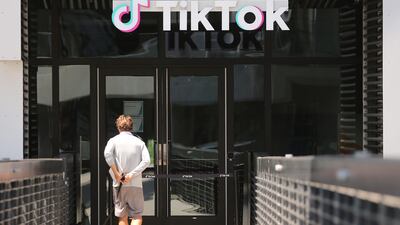A looming US ban on TikTok will force its user base to “precipitously decline”, by as much as 90 per cent, and drive content creators to “less attractive and less functional” substitutes, the video sharing app said in a new court filing.
Nearly 40 to 50 per cent of its daily active users will not return to the platform even if the ban is lifted after two months. If it stays for up to six months, 80 to 90 per cent of daily active users are less likely to return, the company added.
“Even if the TikTok ban is later lifted, we would not be able to make up for lost ground … people will have already turned to other competing platforms such as Byte, Triller, Zynn and Reels to fill the void,” Vanessa Pappas, TikTok's interim global head, said in the court petition.
Last Friday, the US Commerce Department said it will issue an order that will bar Americans from downloading the video-sharing app starting September 20. Later, US President Donald Trump delayed the enforcement of the order by a week.
The company said the US ban will have a major impact on its global growth because content created and shared by the US users is “highly exportable” to other English-speaking markets like the UK, Canada, and Australia.
“US content can comprise as much as 60 per cent of the content in TikTok’s non-US markets. Banning [that] will result in a massive decrease in content available globally, which will decrease business,” Ms Pappas said.
She also said that such a step will devastate its US workforce, “permanently harming its ability to recruit and retain talent”.
Since July 1, 52 candidates have declined offers of employment with ByteDance and TikTok due to the perceived uncertainty about its existence in the US.
Launched in China in September 2016, TikTok is owned by Beijing-based technology firm ByteDance. It was rolled out in the US in 2018 after ByteDance’s $1 billion (Dh3.67bn) purchase of lip-synching app Musical.ly. TikTok allow users to create and share 15-second videos while providing musical soundtracks.
As of August 18, TikTok had 92.8 million monthly active users in the US, almost 53 million more than in October last year.
The company said it has always invested “heavily in data privacy and security”.
“We take steps to protect the privacy and security of US user data … including industry-standard encryption to protect data and security controls to protect the integrity of our source code and safeguard against data breaches, hackers and other malicious actors,” Ms Pappas said.
As a first step, the US Commerce Department has ordered the removal of TikTok from the country's app stores on September 27. Subsequently, the app will be shut down entirely in the US on November 12.
Removing the app from the US app stores will halt the influx of new US users, making it unavailable to the hundreds of millions of Americans who have not yet downloaded the app, Ms Pappas said.
“To remain competitive, continued growth at this stage in our development is critical. New users are the lifeblood of a social media application like TikTok … without new users, we cannot compete with other platforms,” she added.
Earlier this month, the Trump administration approved Oracle’s bid for the American operations of TikTok, leading to a tentative deal where Oracle and Walmart would get a combined 20 per cent stake in a global TikTok business. However, a final deal looked uncertain when ByteDance said it would never give up majority control over TikTok.


